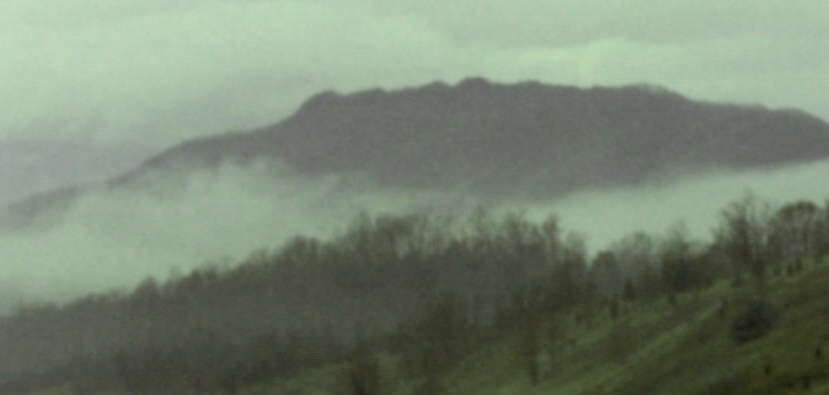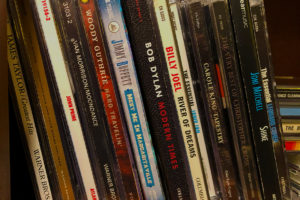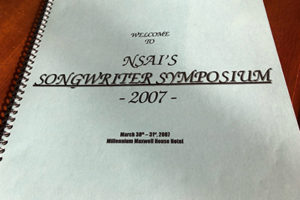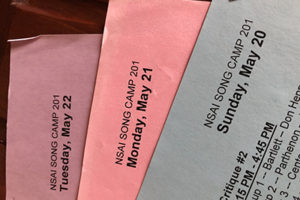Another Journey
From the moment in November 2006 when I decided to become a songwriter my life had a purpose and a goal. Although I could dimly see my destination, I was on a day-to-day journey not knowing exactly what was next. Going to Blue Ridge Song Camp was a huge step on that journey.
When I arrived at Blue Ridge Song Camp on Sunday, June 17, 2007, I had spent two days in the car alone. I had spent the night in a hotel and had driven part of the Blue Ridge Parkway. My favorite CDs were my companions. And, I enjoyed every minute. This trip to the Blue Ridge Song Camp in Virginia was beyond my imagination!
To live is to be musical, starting with the blood dancing in your veins. Everything living has a rhythm. Do you feel your music?
— Michael Jackson (1958-2009) American singer, songwriter, and dancer
The Teachers at Blue Ridge Song Camp
Paul Reisler
Paul Reisler’s sweet, humble, and giving attitude permeated every class. His philosophy about songwriting is that you learn by doing it. Thus, one of the goals for the week revolved around writing a song. His class in the mornings gave us creative tools to do that. And, the week was not just about writing, but also performing—sharing your songs with those around you.
One of Paul’s projects is Kid Pan Alley. He does residencies in schools and writes a song with the children. Amy Grant, Sissy Spacek, Delbert McClinton, the Nashville Chamber Orchestra, and many others have recorded Kid Pan Alley songs. We were able to sit in on one of the Kid Pan Alley sessions. The rapport he develops with the children is amazing.
Some of Paul’s quotes:
Use your music to make the world a better place (especially in your community).
The melody is the essence of the music. It contains the rhythm, harmony, and accompaniment decisions. Let the melody say what happens. The melody is what we remember.
Strip away the things that are false. This is who I am. This is what I do.
You don’t work on songs. They work on you.
Don’t forget why you got into music in the first place. Write it down and look at it periodically to remind yourself.
Julie Portman
Julie Portman, Paul’s wife, was an actress, playwright, and singer. Her classes involved performance, stage presence, and how to write life stories. Sadly, she passed away on Sunday, December 21, 2008. She was beloved and I am sure her presence is still felt by everyone who had the opportunity to meet her. Her lovely teaching spirit shines bright within us.
For me, the most powerful illustration Julie used to teach us about “giving” our song to the audience involved her beautiful, heirloom ring. The class sat in a circle. Julie got up and stood in the middle of the circle. As she turned and looked all of us in the eye, she explained about giving our song to the audience. Then she came over and stood in front of me. She removed her ring and as I held my hand out to her, she carefully placed her precious ring in the palm of my hand.
In that instant I understood the power, the mystery, and the awesome nature of this act. The singer wants to give the song away. The singer wants the audience to receive the song. It is also necessary that I (the audience) must accept the song that the singer offers. It is a giving and receiving. She said, “There is a loop of energy between the singer and the audience.”
In one class, Julie said this about singing our songs: Showing (for example, extending our arms) is not being. You want to be the images. She said, ”Live the story while you sing it. You can write about a static relationship, but you have to live it to make it more alive and now.”
Julie also emphasized that the instrument we play has a role in the song. An instrument is never simply an instrument. It could be our grandmother or our dancing partner. It will be different for each song, but it must be genuine. The instrument supports what we are doing and is a part of the story.
Some of Julie’s quotes:
At the core of all art forms is the desire to tell a story.
The ordinary is the entrance to the extraordinary.
Every single experience we have contains all our other experiences.
Live what the story is while you sing it.
To be able to hear or completely listen in the moment, release where you’ve been. You have to be in the present to listen.
John McCutcheon
John McCutcheon is a folksong singer and singer-songwriter. He stressed the importance of sharing songs with the community and writing songs for special occasions, such as baptisms, birthdays, or any event.
In one of John’s classes we divided into groups and wrote a community-minded song. Each group chose a pertinent topic that made them feel impassioned. We kept the following in mind as we wrote: “Music can be called on to motivate and inspire people. Music can communicate to people. Music binds people together.”
Some of John’s quotes:
The Music Business wants to make you a passive observer of your culture. We are counter to that. We are creating art.
As fiction writers, empathy is our greatest gift we can give people.
People will go a lot further on what they feel than on what they know.
Don’t be afraid to write crap. Think about your body and let the crap come out. Don’t edit on the first draft. If you don’t let crap out, it will infect everything.
Ron Browning
Ron Browning, who at the time was a vocal coach with the Nashville Jazz Workshop, helped us make our songs come alive by using an honest, conversational singing style. Since then, he has developed quite a reputation and is much in demand. He coached Carried Underwood in preparation for the TV production of “The Sound of Music.” He also coached Vanessa Carlton to play the role of Carole King in the Broadway production of Beautiful—The Carole King Musical.
Some of Ron’s quotes:
No one knows how you feel on the inside. They only know what they see on the outside.
When someone is real we listen closer.
It is a constant struggle to juggle the dark and the light.
Daily Overviews
Monday
The morning started well. I sang, “Sanctuary” during the opening class and everyone responded favorably. Things went downhill when we had to go around the circle and come up with an interesting way to sing our name to introduce ourselves to the group. I flunked that one. Yes, I attempted, but I can’t think clearly in the heat of the moment and especially not in a group setting. Perhaps that led to my insecurity for the next several days. At midday here’s what I wrote in my journal: “alone and awkward . . . typical me.”
Monday afternoon Paul had paired us up with a partner. My partner was Michael. We each had written down three pivotal moments in our life. We chose one and then told our story to our partner.
I told Mike about composer/professor Ross Lee Finney saying that I should keep composing. I told him how I decided to be a songwriter. He told me about the career decisions that led to his marriage.
Paul gave us songwriting excercises each class in the morning. By Saturday we were to have written a song with our partner’s story being the jumping off point. I found it very difficult. I had not written any story songs.
Being miles away from home, I did not know if I could write a song without being in my office surrounded by the things I love and that give me inspiration. After several days, I talked to Mike. I realized that he would be OK if I could not finish it or even write it. That made me feel better. I did write it. It was the first time I tried to tell a story in a song.
Tuesday
One of the attendees showed me how to practice the accompaniments to my songs using chords. He spent about thirty minutes showing me how he works on making piano accompaniments for his songs. He was very sweet and patient to do that.
Inspired by performances down at the Music Barn I wrote this in my journal “There’s a certain quietness when everyone is listening to you.”
Wednesday
All day long there were people who helped and encouraged me. Wednesday morning walking down to the Music Barn for my first class, I was panicking. On the pathway, I happened to run into Mike, my partner from Monday. His presence calmed me. His steady, sweet spirit gave me courage.
Wednesday I wrote this in my journal. I don’t remember what I was thinking, or why I didn’t fill in the blank. ” I didn’t start living my life until____________.” And, midday I wrote this in my journal, “You can’t control what people think about you.”
About lunch time, I happened to run into Ron before he had to leave. He gave me a big hug and kiss on the cheek. It made me feel better. He is so sweet and affirming.
On Wednesday afternoon, when I was considering backing out of the Friday night concert, one of the attendees encouraged me saying, “You are perfect the way you are.” Indeed, we were not compared to anyone else. We were all valued for what we could do and what we had to offer with our music and abilities. He suggested that I sing “Ocean of Whiskey.” I followed his advice and decided that is what I would sing.
Thursday
One of the participants came up to me and said he would like to sing through my song “River Flowing.” He liked it and thought it would lie well in his voice. I gave him a copy. He and his wife are music leaders in their church. The next day he gave me a copy of one of their songs.
Friday
During our first class, I needed individual help from Paul with the song I was writing. I started out by apologizing that it was not metaphorical, the rhymes were basic . . . etc. Then he said, “Stop apologizing for yourself.” He said I was an inspiration to the others. I could (and had) come so far.
During the class, Paul pulled out his guitar and sang his song “If I Were a Tree.” It felt like he sang that just for me. The song is about living musically and creatively. After he sang, he said, “Think about what you feel is the most uncomfortable thing to do musically and just do it in the next two days. Reach beyond what you can do. This is the most supportive atmosphere you’ll ever find. You learn on the edge. Take risks.”
One of the most touching moments of the week was when John McCutcheon sang the song, “When I’m Gone.” It talks about things we can do, but we can’t do them when we are gone. . .”So I guess I’ll have to do it while I’m here.” That song really moved me. It made me think about singing, composing, and everything . . . I have to do them here and now.
You won’t hear me singing this song when I’m gone
So I guess I’ll have to do it while I’m here
— “When I’m Gone” song by Phil Ochs
Saturday
Much of the day Saturday was spent with everyone singing the song they had written during the week from their partner’s story.

It was an emotional day for everyone. Many of the songs were intense . . . stories of abandonment, drug addiction, being emotionally separated from your family, or feeling alone. Boxes of tissue were spread around the room. Paul sat on the floor in the middle of the room and cried as much as everyone else. It was a cathartic session.
Michael sang the song he had written for me which was about realizing that I am a songwriter. After he sang, I said, “I guess I can’t quit now.” They all laughed and agreed. Then someone said, “We’re all looking at you.” I said, “Oh, I guess you want to hear my song.” I sang it. I felt a great sense of accomplishment.
The Music Barn: Nights at the Blue Ridge Song Camp
There was a large building with an open interior space that we called the Music Barn. We would gather there at night to share our songs. These evenings also included the teachers. Many of the participants were professional musicians and singer-songwriters. Often several would pick up their instrument and join in with someone else’s song by playing bass, percussion, or singing back-up vocals. All of the songs were good, and, there were many different styles.
Monday
Sang “Ocean of Whiskey.” Got a good response.
Tuesday
Sang “God Be With You Till We Meet Again.” I sang it a cappella.
Wednesday
Got there late. I sat next to Paul. It soon was my turn to sing. I sang “River Flowing.” I think I heard Paul make a sound that led me to believe he enjoyed my song and thought it was pretty—maybe even moving.
Friday
On Friday, after I did not go to the Music Barn on Thursday night, one of the singers saw me and said he missed me Thursday evening. He said he looked around and said, “Where’s Peg?” That was very touching. I never imagined that anyone missed me or thought about me. (I had not gone because I needed to work on the song I was writing for the Saturday class.)
Friday Night Concert
I am not sure I realized it had happened until Friday night during the concert: I was a different person now. While I was singing and playing “Ocean of Whiskey” at the concert I felt totally at ease. And, more than that, I suddenly felt like I was doing something natural. I was able to forget everything else but that moment.
When I began taking voice lessons with Ron my highest expectation was that I would eventually just be able to sing my songs to some degree. I never expected the connection I would feel that evening. That night I knew that if Peg was able to do that, then she was not the same person who had arrived on Sunday. All the classes, the love and support from everyone, and hard work provided the foundation for that evening.
Everyone was proud of me and complimentary. One person said he thought it was the best song on the concert. I don’t know about that, but I think I held my own. The song seemed to connect with people on an emotional level. After the concert, three people commented about similar situations in their family and dealing with alcoholism.
Thoughts about the Week at the Blue Ridge Song Camp
There were many experiences during the week that changed the way I look at myself, music, and the world. During the week, music became more a part of the natural flow of my life. Paul impressed on us that our response to the world should be expressed in our creativity. Knowing that there are people out there writing such wonderful music and making a difference in the world inspires me to do the best I can.
Songwriting seemed so natural for them. Creating music filled them with joy. When I got back home, I felt more capable of being able to trust my instincts and my abilities to be creative. Blue Ridge Song Camp was a huge step in my songwriting journey.
Life should be joyful. Music should not be stressful. I can’t think of how to describe this except for something that Ron tells me in my voice lessons. When we discuss how to sing a phrase, or how to pick the note I want to be the “star” on the tree, or even how to decorate my “tree.” He tells me, “It’s your tree. You can decorate it the way you want to.” One time I answered back, “You mean there’s not someone standing behind me telling me to put the ornament there, or judging me on how I am doing it?”
During that week at camp, I realized that it is OK to sing my songs how I want to sing them. I can be who I am in that moment.
In my experience, we grow and change by meeting people and having interactions with them. Being surrounded with so many wonderful musicians at Blue Ridge Song Camp, I was able to experience music like I never have. The supportive, loving atmosphere enabled me to step out of my comfort zone—which although uncomfortable at times, brought a freedom and joy.










Leave a Reply
Your email is safe with us.